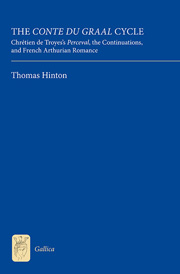 The Conte du Graal Cycle
The Conte du Graal Cycle Book contents
- Frontmatter
- Contents
- List of illustrations
- Acknowledgments
- List of Abbreviations
- Manuscript Sigla
- Introduction
- 1 Narrative Aesthetic and Cyclic Formation
- 2 Manuscripts, Memory and Textual Transmission
- 3 Authorship, Kinship and the Ethics of Continuation
- 4 Rereading the Evolution of Arthurian Verse Romance
- Conclusion
- Appendix 1 Narrative Summaries
- Appendix 2 Lengths and Dates of Texts
- Appendix 3 Manuscripts of the Conte du Graal Cycle
- Appendix 4 Full Contents of Conte du Graal Cycle manuscripts
- Appendix 5 Arthurian Verse Romances: Dates and Manuscripts
- Appendix 6 Contents of Arthurian Verse Romance Manuscripts
- Bibliography
- General Index
- Index of Manuscripts
- Miscellaneous Endmatter
2 - Manuscripts, Memory and Textual Transmission
Published online by Cambridge University Press: 05 September 2013
- Frontmatter
- Contents
- List of illustrations
- Acknowledgments
- List of Abbreviations
- Manuscript Sigla
- Introduction
- 1 Narrative Aesthetic and Cyclic Formation
- 2 Manuscripts, Memory and Textual Transmission
- 3 Authorship, Kinship and the Ethics of Continuation
- 4 Rereading the Evolution of Arthurian Verse Romance
- Conclusion
- Appendix 1 Narrative Summaries
- Appendix 2 Lengths and Dates of Texts
- Appendix 3 Manuscripts of the Conte du Graal Cycle
- Appendix 4 Full Contents of Conte du Graal Cycle manuscripts
- Appendix 5 Arthurian Verse Romances: Dates and Manuscripts
- Appendix 6 Contents of Arthurian Verse Romance Manuscripts
- Bibliography
- General Index
- Index of Manuscripts
- Miscellaneous Endmatter
Summary
In the prologue to his Roman de Troie, Benoît de Sainte-Maure recounts how Cornelius, nephew of Sallust, came across Dares Phrygias's eyewitness account of the fall of Troy one day while browsing for grammar books in a bookcase. As Benoît tells it, dares felt compelled to leave a written record of the events he was witnessing:
Por ço qu'il vit si grant l'afaire
Que ainz ne puis ne fu nus maire,
Si voust les faiz metre en memoire;
En grezeiz en escrist l'estoire.
[Seeing that these were the most significant events that there had ever been, or would ever be, he wanted to consign the facts to memory: he wrote the story in Greek.]
The fiction of narrative genesis that Benoît presents involves a fairly complex interaction of oral and written authority, encapsulated in the apparently straightforward act of ‘metre en memoire’: events are written down by ocular witnesses and handed down the generations via a double translation, first into Latin and then French (thus mirroring the trajectory of learning and empire described by Chrétien de Troyes in the prologue to Cligés). Significantly, the latter translation is also that of an ancient source document into a performed romance narrative.
This vignette illustrates some of the issues that pertain to both the reality and the representation of textual transmission in the Middle Ages, and which I will be discussing in this chapter. In particular, the rhyme pair of memoire/estoire encapsulates the instability of distinctions made between ‘performative oral’ and ‘documentary written’ modes of thought and practice in medieval literature.
- Type
- Chapter
- Information
- The Conte du Graal CycleChrétien de Troyes's Perceval, the Continuations, and French Arthurian Romance, pp. 70 - 110Publisher: Boydell & BrewerPrint publication year: 2012


